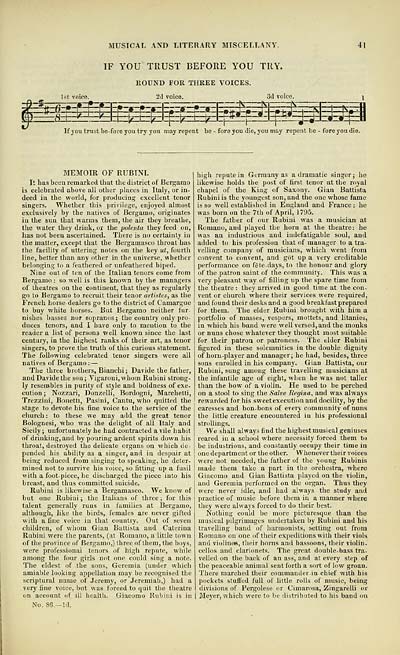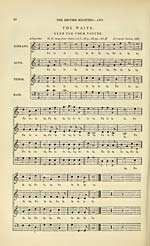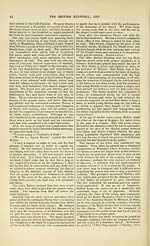Glen Collection of printed music > Printed music > British minstrel, and musical and literary miscellany
(733) Page 41 - If you trust before you try
Download files
Complete book:
Individual page:
Thumbnail gallery: Grid view | List view

MUSICAL AND LITERARY MISCELLANY.
41
1st voice.
IF YOU TRUST BEFORE YOU TRY.
ROUND FOR THREE VOICES.
2J voice. 3d voico.
:t=[^
f=p=pr^=ri=f=P=s:
rtrt^
T-
qs
I — 1-5^
-I -*-*■
l^zgi
If you trust be-fore you try you may repent be - fore you die, you mriy repent bo - fore you die.
BIEMOIR OF RUBINL
It has been remarked that the district of Bergamo
is celebrated above all other places in Italy, or in-
deed in the world, for producing excellent tenor
singers. Whether this privilege, enjoyed almost
exclusively by the natives of Bergamo, originates
in the sun that warms them, the air they breathe,
the water they drink, or the polenta they feed on,
has not been ascertained. There is no certainty in
the matter, except that the Bergamasco throat has
the facility of uttering notes on the key ut, fourth
line, better than any other in the universe, whether
belonging to a feathered or unfeathered biped.
Nine out of ten of the Italian tenors come from
Bergamo : so well is this known by the managers
of theatres on the continent, that they as regularly
go to Bergamo to recruit their tenor artistes, as the
French horse-dealers go to the district of Camargue
to buy white horses. But Bergamo neither fur-
nishes basses nor sopranos ; the country only pro-
duces tenors, and I have only to mention to the
reader a list of persons well known since the last
century, in the highest ranks of their art, as tenor
singers, to prove the truth of this curious statement.
The following celebrated tenor singers were all
natives of Bergamo : —
The three brothers, Bianchi ; Davide the father,
and Davide the sou ; Vigaroni,whom Rubini strong-
ly resembles in purity of style and boldness of exe-
cution ; Nozzari, Donzelli, Bordogni, Marchetti,
Trezzini, Bonetti, Pasini, Cantu, who quitted the
stage to devote his fine voice to the service of the
church: to these we may add the great tenor
Bolognesi, who was the delight of all Italy and
Sicily ; unfortunately he had contracted a vile habit
of drinking, and by pouring ardent spirits down his
throat, destroyed the delicate organs on which de-
pended his ability as a singer, and in despair at
being reduced from singing to speaking, he deter-
mined not to survive his voice, so fitting up a fusil
with a foot-piece, he discharged the piece into his
breast, and thus committed suicide.
Rubini is likewise a Bergamasco. We know of
but one Rubini ; the Italians of three ; for this
talent generally runs in families at Bergamo,
although, like the birds, females are never gilted
with a fine voice in that country. Out of seven
children, of whom Gian Battista and Caterina
Rubini were the parents, (at Romano, a little town
of the province of Bergamo,) three of them, the boys,
were professional tenors of high repute, while
among the four girls not one could sing a note.
The eldest of the sons, Geremia (under which
amiable looking appellation may be recognised the
scriptural name of Jeremy, or Jeremiah,) had a
very fine voice, but was forced to quit the tlieatre
on account of ill health. Giacomo Rubini is in
No. 86.— Ul.
high repute in Germany as a dramatic singer; he
likewise holds the post of first tenor at the royal
chapel of the King of Saxony. Gian Battista
Rubini is the youngest son, and the one whose fame
is so well established in England and France: he
was born on the 7th of April, 1795.
The father of our Rubini was a musician at
Romano, and played the horn at the theatre: he
was an industrious and indefatigable soul, and
added to his profession that of manager to a tra-
velling company of musicians, which went from
convent to convent, and got up a very creditable
performance on fete-days, to the honour and glory
of the patron saint of the community. This was a
very pleasant way of filling up the spare time from
the theatre : they arrived in good time at the con-
vent or church where their services were required,
and found their desks and a good breakfast prepared
for them. The elder Rubini brought with him a
portfolio of masses, vespers, mottets, and litanies,
in which his band were well versed, and the monks
or nuns chose whatever they thought most suitable
for their patron or patroness. 'I'he elder Rubini
figured in these solemnities in the double dignity
of horn -player and manager; he had, besides, three
sons enrolled in his company. Gian Battista, our
Rubini, sung among these travelling musicians at
the infantile age of eight, when he was not taller
than the bow of a violin. He used to be perched
on a stool to sing the Salve Regina, and was always
rewarded for his sweet execution and docility, by the
caresses and bon-bons of every community of nuns
the little creature encountered in his professional
stroUings.
We shall always find the highest musical geniuses
reared in a school where necessity forced them to
be industrious, and constantly occupy their time in
one department or the other. Whenever their voices
were not needed, the father of the young Rubinis
made them take a part in the orchestra, where
Giacomo and Gian Battista played on the violin,
and Geremia performed on the organ. Thus they
were never idle, and had always the study and
practice of music before them in a manner where
they were always forced to do their best.
Nothing could be more picturesque than the
musical pilgrimages undertaken by Rubini and his
travelling band of harmonists, setting out from
Romano on one of their expeditions with their viols
and violinos, their horns and bassoons, their violin-
cellos and clarionets. The great double-bass tra-
velled on the back of an ass, and at every step of
the peaceable animal sent forth a sort of low groan.
There marched their commander-in-chief with his
pockets stuffed full of little rolls of music, being
divisions of Pergolese or Cimarosa, Zingarelli or
Sleyer, which were to be distributed to his band oa
41
1st voice.
IF YOU TRUST BEFORE YOU TRY.
ROUND FOR THREE VOICES.
2J voice. 3d voico.
:t=[^
f=p=pr^=ri=f=P=s:
rtrt^
T-
qs
I — 1-5^
-I -*-*■
l^zgi
If you trust be-fore you try you may repent be - fore you die, you mriy repent bo - fore you die.
BIEMOIR OF RUBINL
It has been remarked that the district of Bergamo
is celebrated above all other places in Italy, or in-
deed in the world, for producing excellent tenor
singers. Whether this privilege, enjoyed almost
exclusively by the natives of Bergamo, originates
in the sun that warms them, the air they breathe,
the water they drink, or the polenta they feed on,
has not been ascertained. There is no certainty in
the matter, except that the Bergamasco throat has
the facility of uttering notes on the key ut, fourth
line, better than any other in the universe, whether
belonging to a feathered or unfeathered biped.
Nine out of ten of the Italian tenors come from
Bergamo : so well is this known by the managers
of theatres on the continent, that they as regularly
go to Bergamo to recruit their tenor artistes, as the
French horse-dealers go to the district of Camargue
to buy white horses. But Bergamo neither fur-
nishes basses nor sopranos ; the country only pro-
duces tenors, and I have only to mention to the
reader a list of persons well known since the last
century, in the highest ranks of their art, as tenor
singers, to prove the truth of this curious statement.
The following celebrated tenor singers were all
natives of Bergamo : —
The three brothers, Bianchi ; Davide the father,
and Davide the sou ; Vigaroni,whom Rubini strong-
ly resembles in purity of style and boldness of exe-
cution ; Nozzari, Donzelli, Bordogni, Marchetti,
Trezzini, Bonetti, Pasini, Cantu, who quitted the
stage to devote his fine voice to the service of the
church: to these we may add the great tenor
Bolognesi, who was the delight of all Italy and
Sicily ; unfortunately he had contracted a vile habit
of drinking, and by pouring ardent spirits down his
throat, destroyed the delicate organs on which de-
pended his ability as a singer, and in despair at
being reduced from singing to speaking, he deter-
mined not to survive his voice, so fitting up a fusil
with a foot-piece, he discharged the piece into his
breast, and thus committed suicide.
Rubini is likewise a Bergamasco. We know of
but one Rubini ; the Italians of three ; for this
talent generally runs in families at Bergamo,
although, like the birds, females are never gilted
with a fine voice in that country. Out of seven
children, of whom Gian Battista and Caterina
Rubini were the parents, (at Romano, a little town
of the province of Bergamo,) three of them, the boys,
were professional tenors of high repute, while
among the four girls not one could sing a note.
The eldest of the sons, Geremia (under which
amiable looking appellation may be recognised the
scriptural name of Jeremy, or Jeremiah,) had a
very fine voice, but was forced to quit the tlieatre
on account of ill health. Giacomo Rubini is in
No. 86.— Ul.
high repute in Germany as a dramatic singer; he
likewise holds the post of first tenor at the royal
chapel of the King of Saxony. Gian Battista
Rubini is the youngest son, and the one whose fame
is so well established in England and France: he
was born on the 7th of April, 1795.
The father of our Rubini was a musician at
Romano, and played the horn at the theatre: he
was an industrious and indefatigable soul, and
added to his profession that of manager to a tra-
velling company of musicians, which went from
convent to convent, and got up a very creditable
performance on fete-days, to the honour and glory
of the patron saint of the community. This was a
very pleasant way of filling up the spare time from
the theatre : they arrived in good time at the con-
vent or church where their services were required,
and found their desks and a good breakfast prepared
for them. The elder Rubini brought with him a
portfolio of masses, vespers, mottets, and litanies,
in which his band were well versed, and the monks
or nuns chose whatever they thought most suitable
for their patron or patroness. 'I'he elder Rubini
figured in these solemnities in the double dignity
of horn -player and manager; he had, besides, three
sons enrolled in his company. Gian Battista, our
Rubini, sung among these travelling musicians at
the infantile age of eight, when he was not taller
than the bow of a violin. He used to be perched
on a stool to sing the Salve Regina, and was always
rewarded for his sweet execution and docility, by the
caresses and bon-bons of every community of nuns
the little creature encountered in his professional
stroUings.
We shall always find the highest musical geniuses
reared in a school where necessity forced them to
be industrious, and constantly occupy their time in
one department or the other. Whenever their voices
were not needed, the father of the young Rubinis
made them take a part in the orchestra, where
Giacomo and Gian Battista played on the violin,
and Geremia performed on the organ. Thus they
were never idle, and had always the study and
practice of music before them in a manner where
they were always forced to do their best.
Nothing could be more picturesque than the
musical pilgrimages undertaken by Rubini and his
travelling band of harmonists, setting out from
Romano on one of their expeditions with their viols
and violinos, their horns and bassoons, their violin-
cellos and clarionets. The great double-bass tra-
velled on the back of an ass, and at every step of
the peaceable animal sent forth a sort of low groan.
There marched their commander-in-chief with his
pockets stuffed full of little rolls of music, being
divisions of Pergolese or Cimarosa, Zingarelli or
Sleyer, which were to be distributed to his band oa
Set display mode to: Large image | Transcription
Images and transcriptions on this page, including medium image downloads, may be used under the Creative Commons Attribution 4.0 International Licence unless otherwise stated. ![]()
| Special collections of printed music > Glen Collection of printed music > Printed music > British minstrel, and musical and literary miscellany > (733) Page 41 - If you trust before you try |
|---|
| Permanent URL | https://digital.nls.uk/91443741 |
|---|
| Description | Scottish songs and music of the 18th and early 19th centuries, including music for the Highland bagpipe. These are selected items from the collection of John Glen (1833 to 1904). Also includes a few manuscripts, some treatises, and other books on the subject. |
|---|
| Description | The Glen Collection and the Inglis Collection represent mainly 18th and 19th century Scottish music, including Scottish songs. The collections of Berlioz and Verdi collected by bibliographer Cecil Hopkinson contain contemporary and later editions of the works of the two composers Berlioz and Verdi. |
|---|

